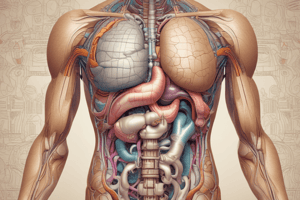Podcast
Questions and Answers
Which of the following are major digestive organs? (Select all that apply)
Which of the following are major digestive organs? (Select all that apply)
- Mouth (correct)
- Small Intestine (correct)
- Liver
- Stomach (correct)
Which of the following are accessory organs? (Select all that apply)
Which of the following are accessory organs? (Select all that apply)
- Liver (correct)
- Esophagus
- Gallbladder (correct)
- Pancreas (correct)
What is a bolus?
What is a bolus?
Chewed food that is swallowed and passes through the esophagus.
What is acidic chyme?
What is acidic chyme?
Where does digestion begin?
Where does digestion begin?
What is the function of the stomach?
What is the function of the stomach?
What is the duodenum?
What is the duodenum?
What produces pancreatic enzymes?
What produces pancreatic enzymes?
What does bile do?
What does bile do?
The muscular action that allows a bolus of food to pass from the mouth to the stomach is called ______.
The muscular action that allows a bolus of food to pass from the mouth to the stomach is called ______.
What is gastrin?
What is gastrin?
What does secretin target?
What does secretin target?
What triggers the release of cholecystokinin (CCK)?
What triggers the release of cholecystokinin (CCK)?
What happens when acid enters the duodenum?
What happens when acid enters the duodenum?
What is lactose intolerance?
What is lactose intolerance?
What is the primary function of microvilli?
What is the primary function of microvilli?
What causes gastroesophageal reflux disease (GERD)?
What causes gastroesophageal reflux disease (GERD)?
What is pepsinogen?
What is pepsinogen?
What does amylase digest?
What does amylase digest?
What enzymes are produced in the stomach?
What enzymes are produced in the stomach?
What buffers are released from the pancreas?
What buffers are released from the pancreas?
What triggers the autonomic nervous system to release gastrin?
What triggers the autonomic nervous system to release gastrin?
Flashcards are hidden until you start studying
Study Notes
Major Digestive Organs
- Mouth, stomach, and small intestine play crucial roles in digestion.
- The mouth begins the process by mechanically breaking down food and starting carbohydrate digestion.
Accessory Organs
- Liver produces bile, gallbladder stores it, and pancreas produces digestive enzymes.
- Pancreas has both endocrine (hormone insulin) and exocrine (digestive enzymes) functions.
Bolus and Chyme
- Bolus is chewed food that travels down the esophagus through peristalsis.
- Acidic chyme is the mixture of partially digested food and gastric juices, entering the small intestine for further digestion.
Digestive Process in the Stomach
- Stomach chemically digests proteins, releasing gastrin in response to stretching.
- Gastrin triggers secretion of hydrochloric acid (HCl) and pepsinogen, which converts to pepsin for protein digestion.
- Stomach maintains a highly acidic pH (1-2).
Small Intestine Functionality
- Major site for digestion and absorption of carbohydrates, proteins, and fats with a neutral pH (7-8).
- Produces various enzymes including peptidase, sucrase, maltase, and lactase.
Hormones Regulating Digestion
- Cholecystokinin (CCK) stimulates gallbladder contraction for bile release and pancreatic enzyme secretion.
- Secretin, released in response to acidic chyme, triggers bicarbonate release from the pancreas to neutralize acidity.
- Gastrin promotes secretion of HCl and pepsinogen from the stomach.
- Vasoactive Intestinal Peptide (VIP) increases capillary dilation within the intestinal villi enhancing nutrient absorption.
Digestive Enzymes
- Key enzymes include amylase (carbohydrates), pepsin (proteins), and various pancreatic enzymes such as trypsin and lipase.
- Digestive enzyme production is triggered by hormones like CCK.
Nutrient Absorption
- Nutrients are absorbed in the small intestine through microvilli and enter the bloodstream for cellular usage.
Gut Conditions
- Lactose intolerance results from insufficient lactase for lactose digestion.
- Stomach and duodenal ulcers arise from excessive acid and insufficient protective mucus.
- Helicobacter pylori is a bacterium that can cause ulcers by surviving stomach acid.
Importance of Buffers
- Buffers, including bicarbonate and hemoglobin, help maintain pH balance in the small intestine.
- Essential for optimal enzyme function and protection against acid damage.
Nutrients and Digestion
- Complete digestion results in glucose from carbohydrates, fatty acids and glycerol from lipids, and amino acids from proteins.
Cellular Functions
- Chief cells in the stomach produce pepsinogen, while parietal cells produce HCl and intrinsic factor essential for vitamin B12 absorption.
Studying That Suits You
Use AI to generate personalized quizzes and flashcards to suit your learning preferences.




